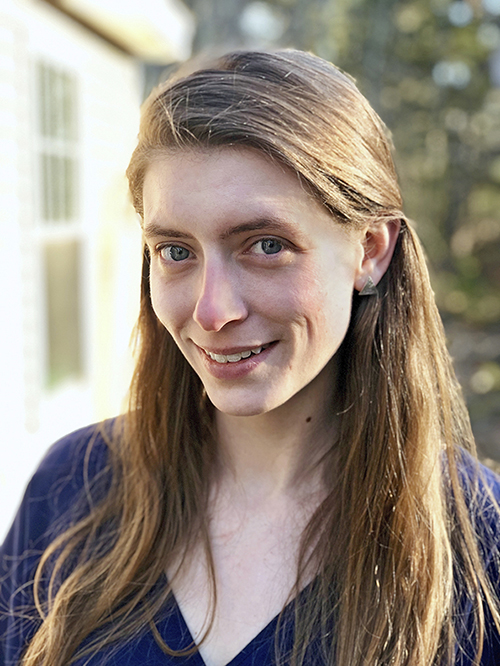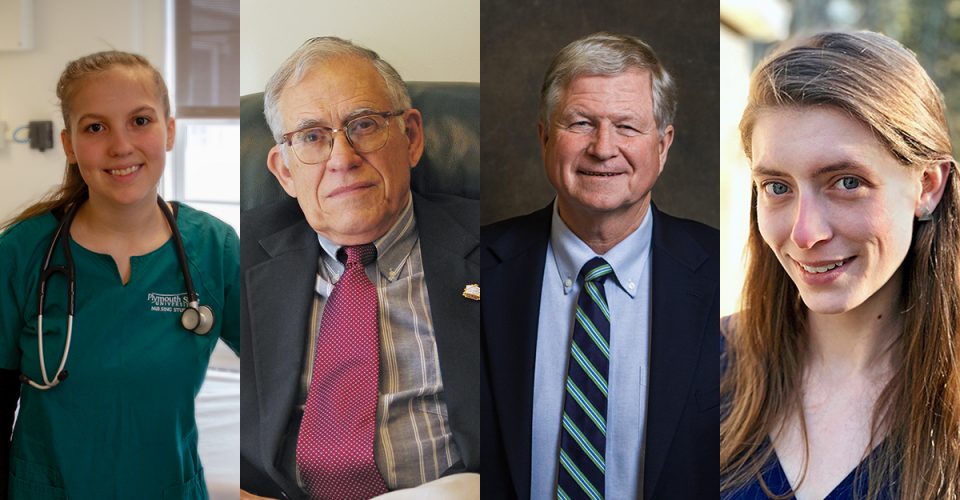When Plymouth State University Professor Emeritus Manuel Márquez-Sterling fled Cuba in 1960, his English was limited and his future uncertain, but he told himself he would make a life in his adopted country. Fifty-three years later, he was an emeritus professor at Plymouth State and a co-writer of Marking the Moment, a musical celebration of the town of Plymouth’s two hundred-fiftieth anniversary. The production went on to win the New England Moss Hart Memorial Award from the New England Theatre Conference, another accomplishment for a man who refused to give up.
Perseverance wears many faces. For some, it manifests as triumph over adversity, while for others, it comes with showing up consistently and getting the job done. In every instance, the Plymouth State community is made stronger by the effort.

STUDENT
Savannah Scott ’22
Savannah Scott (featured above) was valedictorian of her high school class, an even more remarkable accomplishment when one learns her backstory. “Growing up, I was told I would never do anything with my life, and at age 15, I went into foster care.”
Scott’s odds for completing her education weren’t good. According to Casey Family Programs, the nation’s largest operating foundation focused on foster care, only 31 percent of children who grow up in foster care graduate high school and less than three percent graduate from a four-year college. Scott had other ideas. “I thought, ‘I’m better than this, and I can do what I want,’ so I turned my back on what had come before and got to work.”
School had always been a refuge for Scott, so rededicating herself to study felt right. “When I was younger, school was an escape, and I felt pride in doing well,” she explains. “I also had two older sisters who were role models. Both went to college, earned master’s degrees, and found good jobs. I wanted to be like them and decided I wasn’t going to let my problems define me.”
“I thought, ‘I’m better than this, and I can do what I want,’ so I turned my back on what had come before and got to work.”
-Savannah Scott ’22
Scott has remained true to that commitment. She earned a 3.87 GPA her first semester at Plymouth State in the Nursing Program and has become an active advocate for the foster care system. After completing her degree, she plans to work as a registered nurse for a few years, and then may go back to school to become a nurse practitioner or a doctor.
“I know it’s said all the time, and yes, it’s a cliché, but anything you put your mind to, you can do,” she says. “I was given so many opportunities to fail, but I said, ‘No, I’m going to do something else with my life.’”
STAFF
John Clark
John Clark, a vital member of the community for over 50 years, is something of a legend at Plymouth State. It’s a bit of a surprise, then, to hear him say that he came to town under protest. “I arrived in 1967 as a student and, like some others, I didn’t want to be here,” he recalls. “Vietnam was a big deal at the time and I wanted to go into the service. But my parents said, ‘Go to Plymouth State for one year, then make your decision.’ That year changed everything.”
Clark was embraced from the moment he arrived on campus. “I wasn’t a great student, but I found a love of learning because of the faculty and a love of involvement with the staff. They cared about me. I’m still here and still involved, and it all spun out of that first year.”

Photo: Kaleb Hart ’11 photo.
After graduating with a bachelor’s in history and a master’s in education, Clark taught briefly in Ashland, NH, then returned to campus as associate director of admissions. He remained for the rest of his career, occupying a half-dozen different roles from director of the student union to director of athletics. “Changing jobs within the institution was very important to me,” he notes. “I found it totally rejuvenating to learn new things and take on new challenges.” Clark ended his tenure at PSU with a two-year stint managing ALLWell North, the school’s outstanding academic and athletic complex. “Running ALLWell made me feel like I was 20-years-old again,” he says.
Clark was also an active member of the community over the years, holding numerous part-time jobs including policeman and firefighter. This dual embrace of town and gown is no surprise: in Clark’s eyes, the two are inseparable. “There’s a sense that we’re all in this together,” he asserts. “It’s evident everywhere—from things such as architecture to the shared use of facilities, and the practice of giving our education students prime spots in the Plymouth public school district for teacher observations.”
Clark is a firm believer in the power of PSU’s shared sense of community. “You persevere because you’re doing something that really matters,” he explains. “You’re helping students to succeed, not just in school, but in life. I felt the support of the Plymouth community when I was a student, and the experience has never left me.”
DONOR
Craig Souza ’87
Colonel Craig Souza is a decorated Air Force veteran whose commendations include the Defense Superior Service Medal and the Bronze Star Medal. He never planned to join the military; he was simply offered an opportunity and seized it, as he has done throughout his life.
“I was working toward my degree in atmospheric science and landed an internship at the National Weather Service,” he recalls. “The meteorologist in charge recommended I speak to the recruiter, whose office was in the same building, about getting some experience in the field, and the next thing I knew I was signing up for the delayed entry program.”
Souza took full advantage. He was selected by both the Air Force and the Army to serve as the Army’s highest-ranking meteorologist and stockpiled a rich trove of experiences. “I took assignments other people didn’t want and went to places others didn’t want to go to,” he says. “I believe in constantly moving forward, never taking ‘no’ for an answer, constantly learning, never underestimating yourself, and adapting to new situations.”
“I believe in constantly moving forward, never taking ‘no’ for an answer, constantly learning, never underestimating yourself, and adapting to new situations.”
Craig Souza ’87
Souza believes that college is a wonderful environment for establishing patterns and developing mechanisms for learning, and that Plymouth State’s supportive, tight-knit community makes it especially nurturing. “As a student, I took advantage of all the things that Plymouth had to offer,” he says. “I worked in the athletic department, washing clothes, mopping floors, and interacting with wonderful people like John Clark, who is the epitome of service. I learned from the bottom up, watched how successful people did things, and gained valuable insights into how to lead.”

Souza has drawn on these lessons ever since, which he says is why he started financially supporting the University upon graduation. “It was small amounts at first, but my goal has always been to bring along the next generation.” Today, Souza’s generous total support of Plymouth State includes the recently established Colonel Craig Souza “That I May Serve” Scholarship. This annual award of $1,000 supports an undergraduate or graduate student who has performed a heroic act as a civilian, as a current or former member of the military, or as a member of a military family. (If these criteria cannot be met, the scholarship may be awarded to a student who is in law enforcement or the fire department, or who is a first responder.) “I wanted to give others an opportunity to gain experience by working as an intern or a researcher or with a professor, rather than working a third job to help pay for school,” he explains.
Souza returned to Plymouth after retiring and now spends his days giving back to his alma mater in myriad ways, cheering on athletes and sharing his gained experience.
“I’ve been very lucky…at Plymouth State and throughout my life,” he says. “I’ve never been afraid to ask for help when I needed it, and I’ve been blessed by great mentors. I’ve learned that you gain more from helping others than from helping yourself. If you work hard and are open to new experiences, it’s amazing what you get out of life.”
PROFESSOR EMERITUS
Manuel Márquez-Sterling
In 1960, Manuel Márquez-Sterling fled Cuba with his wife Gloria, a young daughter, and $300 in his pocket. The son of Cuban statesman Carlos Márquez-Sterling, Manuel was forced to depart after his father triumphed over candidates Fulgencio Batista and Fidel Castro in the presidential election but was denied his victory due to election fraud. Castro’s revolution began shortly thereafter, making it unsafe for Márquez-Sterling and his family to remain in the country.
“Every time I walk across the bricks in the plaza I step on the brick for 1966, the year I arrived on campus, and I look around and think, ‘We built this.’ I’m so proud that my efforts have enriched this place.”
—Manuel Márquez-Sterling
“When I arrived in Miami, I looked around the airport and thought, ‘Now what do I do?’” he recalls. “But I knew I had to make a life for my wife and daughter in this country, so I drew strength from my family and said to myself, ‘My professional life is not going to end.’”
A practicing attorney in Cuba, Márquez-Sterling began working as a supermarket employee in Miami, then moved to Washington, where he sold shoes. “It was honest work, not demeaning, but it’s not what I was educated for and not the way I wanted to use my knowledge.”
When an opportunity arose to teach Spanish and Latin at a private high school, he jumped. “I didn’t know too much about Latin but had learned a bit in law school, so I just read the textbook and stayed one chapter ahead of my students,” he chuckles.

His real love was history, and he eventually secured a position in the field at Maine’s Ricker College, in a remote town on the Canadian border. In 1966, he applied for a faculty position at Plymouth State College. “They were in the midst of creating the history department, and I was the third faculty member added. I was excited to have the opportunity to build something.” Márquez-Sterling also interviewed for a position in California, but Plymouth had captured his heart. “When I saw Rounds Tower and the mountains, I knew I was home. I had already lost one home in Cuba—I wasn’t about to leave another.”
He remained for the next 32 years, teaching and building the history department, and amassed 45 years altogether, including part-time service. He was granted emeritus status in 1998.
“Perseverance can be interpreted in many ways, by telling yourself ‘I’m going to stick around’ or ‘I’m going to accomplish this goal,’” he observes. “For example, creating Plymouth State’s Annual Medieval and Renaissance Forum, together with Art Professor Mary Taylor and English Professor Richard Chisholm, which lasted 30 years and drew experts to the University from all over the world, is something I’m very proud to have done.
“Every time I walk across the bricks in the plaza I step on the brick for 1966, the year I arrived on campus, and I look around and think, ‘We built this.’ I’m so proud that my efforts have enriched this place.”
ALUMNA
Tegan (Donnelly) Rand
For Tegan Rand, perseverance isn’t just a catchword, it’s a way of life. “It’s carrying on with things even when it feels like it’s not worth doing, and reaching your goal no matter what,” she says.
Rand knows full well the challenges of pursuing a goal despite the odds. The only child of a single mother lost to cancer in her first year of college, Rand powered through her undergraduate journey on willpower, friendships, and numerous part-time jobs, all while maintaining a solid GPA. “All my life, my mother told me, ‘Get a college education, don’t be like me,’” she explains, “so that’s what I did.”

A first-generation college student, Rand credits her success at Plymouth State in part to the University’s TRIO program, a federal initiative run by the Plymouth State Academic Support Services (PASS) Office that serves students who are first-generation, low-income, or disabled. “I’m an introverted person but was offered many opportunities through PASS. I worked at the front desk and that opened many doors for me,” she explains. As did Tutor Coordinator Angie Ricciardi, whom Rand affectionately calls her ‘campus mom.’ “Angie always made sure I had a job and money in the bank.”
Today, Rand manages a fraud team for an online home goods distributor, making sure that “people are who they say they are.” A history major with a double minor in creative writing and women’s studies, she draws on her education every day. “My job requires that I think critically and communicate well, both skills that I learned while at Plymouth State.”
“Don’t give up, and look at all your options—there are many different avenues to get to your goal. And ask for help! Plymouth State is a great community full of people who will support you.”
—Tegan (Donnelly) Rand ’14
Rand doesn’t hesitate to offer words of wisdom to students struggling to persevere. “Don’t give up,” she advises, “and look at all your options—there are many different avenues to get to your goal. And ask for help! Plymouth State is a great community full of people who will support you.”
Rand has experienced this support firsthand. After her mother passed, she moved in with her best friend, Ian Rand ’14, and his family. They formally adopted her at age 24. “Family is what you make of it,” Rand concludes. “I made a very strong and loving family at Plymouth State that I continue to cherish to this day.”
■ Lori Ferguson








